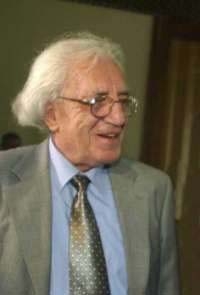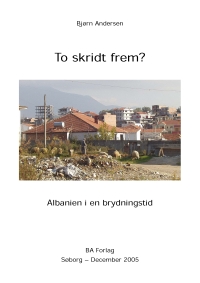
»Tirana Times« - http://www.tiranatimes.com/ - is an Albanian weekly in English. Editor-in-chief is Jerina Zaloshnja. Information about subscription: http://www.tiranatimes.com/subscription.php
Links: • Dritëro Agolli. Biography in Danish Wikipedia [PDF]
• Agolli-articles from the 1970's and 1980's • Ismail Kadaré 2006 (in Danish; some parts in English)
Information om »Sidste Nyt«
»Sidste Nyt om Albanien, Kosóva og Makedonien« hører til et web-site om de Balkan-lande hvor der lever mange Albanere:
http://bjoerna.dk/albanerne.htm.
Her kan du også finde »gamle nyheder«, anmeldelser, links og en Balkan Brevkasse.
»Sidste Nyt« sættes på nettet senest hver fredag morgen, hvor der sendes besked til dem der ønsker det.
Bestilling / afbestilling sker ved at sende en e-mail med teksten »Nyheder udbedes« / »Nyheder afmeldes«.

The framework of The Latest News from Albania, Kosóva and Macedonia is in Danish - nevertheless, the news are mostly in English. You may send information, comments and questions to: »The Latest News« [please click].
Nyheder, materiale, kommentarer og spørgsmål modtages meget gerne, både om småting og større ting. Send en e-mail.
Tilsvarende hvis du opdager en fejl. Fejl vil blive rettet hurtigst muligt.
»Sidste Nyt« og http://bjoerna.dk/albanerne.htm drives non-profit og uden finansiering »udefra«.
Hvis du vil være med til at fiansiere udgivelsen kan du lettest gøre det ved at købe én eller flere af mine bøger.
Send gerne en mail hvis der er - små eller store - tekniske problemer.
Bemærkninger om EDB-sikkerhed.
Du må citere hvis du angiver hovedsidens adresse: bjoerna.dk
Siderne om Albanerne finder du på: bjoerna.dk/albanerne.htm
|
|
»Albanske Studier« bd. 1-2
Kommentarer til Bjøl, Huntington, Machiavelli, Sørlander, DUPI (Humanitær Intervention), Clausewitz, Mao Zedong, Lars R. Møller, Malcolm og flere andre.
Englændere på rejse i Albanien: Edward Lear, Edith Durham og Robert Carver.
Bøger om slægtsfejder og blodhævn. Diskussion af Anne Knudsen's disputats om blodhævn på Korsika og af Ismail Kadare's roman »Ufuldendt april«.
Baggrundsmateriale om den Sønderjyske general Christian von Holstein, der deltog i Habsburgernes felttog ind i Kosóva i 1689-90.
Sidst i bogen et forsøg på en sammenfatning i form af nogle 'grundlæggende synspunkter'.
Desuden en kommentar til Hans Hækkerup's »På skansen«. På CD'en supplerende materiale om traditionelle Albanske klædedragter og om Holstein. Hans bog om Kosovo er omtalt i »Albansk Almanak 2004«.
Du kan downloade indholdsfortegnelsen og kommentaren til »På skansen« fra: http://bjoerna.dk/albansk-historie/studier-2002.htm
Bogen findes i trykt form og på CD (som pdf-fil). Papirudgave 368 A4-sider i 2 bind. Bogen sælges som papirudgave m/ CD og som CD alene. Se pris på: Bestillingsliste.
Til dig der kigger på et ældre nummer af »Sidste Nyt«.
Seneste udgave af denne »annonce« kan ses på:
»Sidste Nyt« (klik)
|
![]()


